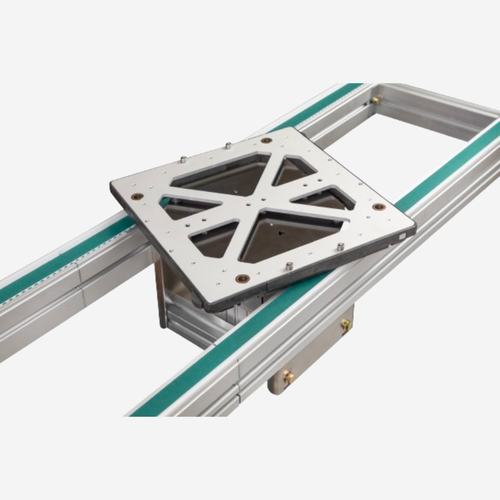Understanding Different Types of Industrial Conveyors and Their Applications
Industrial conveyors are vital components in the material handling systems of many industries. This guide focuses on specific types of conveyors, outlining their features, applications, and benefits so that you can make an informed decision when it comes to choosing the most suitable option for your applications.
Fabric Belt Conveyors
Fabric belt conveyors serve as the cornerstone of efficient material transportation, using a fabric belt to move items along production lines. These conveyors accommodate a wide array of materials and products. Choose from various belt materials, including nylon, polyester, or PVC, tailored to your specific operational requirements. Whether you need enhanced gripping capabilities or features like magnetism or vacuum properties, fabric belt conveyors deliver optimal performance.
Applications
Food Industry: Handling packaged and unpackaged food products
Manufacturing: Transporting raw materials and finished products
Pharmaceuticals: Moving delicate pharmaceutical products
Pros
Versatile and customizable
Smooth, continuous operation
Capable of handling a variety of materials
Cons
Requires regular maintenance to prevent belt wear
Limited load capacity compared to heavy-duty systems
Flexible Chain Conveyors
Flexible chain conveyors offer maneuverability in confined spaces, making them ideal for intricate assembly processes and packaging lines. Crafted with durable plastic chains capable of bending and twisting around corners, these conveyors navigate obstacles with precision. Their space-saving design and versatile applications make them valuable assets in optimizing operational efficiency.
Applications
Packaging: Moving products through various packaging stages
Pharmaceuticals: Transporting medicines and medical products
Assembly Lines: Handling components in tight spaces.
Pros
Space-saving design
Versatile and adaptable
Easy to install and modify
Cons
Limited load capacity
Potential for chain wear and damage
Pallet System Conveyors
Designed for heavy-duty palletized load handling, pallet system conveyors are efficient and precise. They feature industry-compatible pallet sizes and intelligent pin tracking systems, ensuring seamless material flow and logistics management. From warehouse operations to manufacturing facilities, pallet system conveyors streamline processes and enhance productivity.
Applications
Warehousing: Moving pallets within storage areas
Manufacturing: Handling palletized products
Distribution: Transporting goods to shipping areas
Pros
Robust and durable
Suitable for heavy loads
Efficient logistics management
Cons
Requires significant space
Higher initial investment
Sanitary & Stainless-Steel Conveyors
Sanitary and stainless-steel conveyors are designed for industries where cleanliness is paramount. Made from stainless steel and durable plastic components, they offer easy cleaning and sanitation, making them ideal for food processing and medical applications. They also provide durability and regulatory compliance in demanding environments.
Applications
Food Processing: Transporting food products while maintaining hygiene
Medical: Handling medical devices and products
Pharmaceuticals: Moving medicines in a sterile environment
Pros
Easy to clean and sanitize
Compliant with hygiene standards
Durable and long-lasting
Cons
Higher cost compared to standard conveyors
Requires regular cleaning and maintenance
Accumulation Conveyors
Accumulation conveyors provide seamless product storage without disrupting material flow. These conveyors offer a designated space for products to accumulate, preventing jams and damage while optimizing workflow efficiency.
Applications
Warehousing: Storing products before shipping
Manufacturing: Holding products temporarily during production
Distribution: Managing product flow in distribution centers
Pros
Prevents jams and damage
Enhances workflow efficiency
Suitable for various industries
Cons
Requires precise control systems
Higher complexity and maintenance
Conclusion
Choosing the right conveyor system depends on the specific requirements of your operation. Whether you require the versatility of fabric belt conveyors or the hygiene standards of sanitary conveyors, understanding the features and applications of each type can help you optimize your material handling processes for maximum efficiency and productivity.
Contact Us
For more information on Industrial conveyors, please don't hesitate to email us at info@mtnind.com or call us at (833) 721 3165. You can also request a quote via our Contact Us form. Our team is ready to assist you with expert advice and support.





